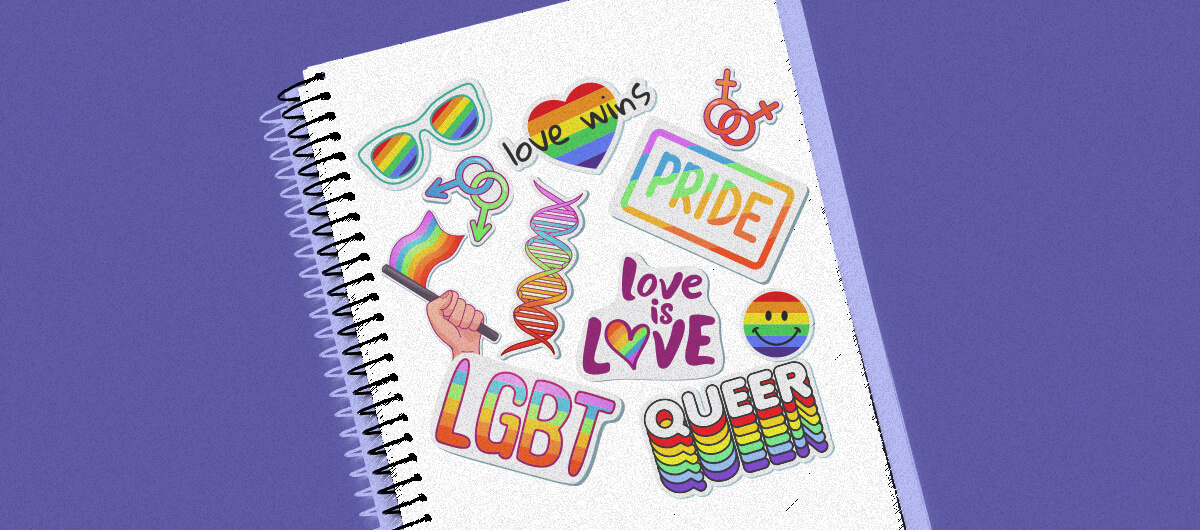

Pride
The Complicated Process of Rejecting Heteronormativity
Even after coming out, this writer had to unearth and confront the negative assumptions she unknowingly held about same-sex relationships.
This article was made possible because of the generous support of DAME members. We urgently need your help to keep publishing. Will you contribute just $5 a month to support our journalism?
For 25 years, I thought I was a great proponent of LGBTQ+ rights. I supported queer friends and acquaintances; I stayed up to date on terms and phrasing; I asked for gender pronouns; I went to Pride. So when I had my first same-sex crush, I thought my transition from ally to community member would be easy.
But then there was that starless January night. I had a half-hour, all to myself, before bed, and I knew exactly how I wanted to spend my time: cocooned in a blanket, journal open in front of me. My favorite kind of night.
I had a few things I wanted to write about, but I started with my celebrity crush, Zoe Saldana as Gamora from Guardians of the Galaxy. In those pre-Endgame days, my friends and I endlessly discussed fan theories, and I wanted to get them down on paper—those and their Natalie-and-Gamora jokes, teasing that left me feeling accepted and loved in my same-sex crush.
About a page into my journaling, my hand cramped. I stopped writing, but my thoughts continued in a confusing spiral: Wasn’t I supposed to understand my sexuality by 25? Where had this crush come from, anyway? This unexpected, inappropriate attraction to another woman…
It took me a moment to process.
Inappropriate? Why did I think it was inappropriate? Because she was a woman? Because I was too?
It was a fever dream, that thought, it had to be, spurred on by the cold, the late hour, the sleep itching at my eyes. I’d grown up in a household, and with a larger extended family, that supported gay rights. I would never call queer relationships inappropriate. Except I had.
On my bed, hunched over my journal, I didn’t know what else to write. Maybe I’d get a glass of water, make a snack, go to sleep. Instead, I laid down, lamplight not quite reaching the ceiling above me. Inappropriate, inappropriate echoed in my head. Limbs heavy, I never wanted to move again.
Revel & Riot, an LGBTQ-run nonprofit, defines internalized homophobia as a queer person’s adoption of, and belief in, the intolerance, stigma, and negative perceptions of the queer community. It often accompanies self-hatred. The term is used alongside “compulsory heterosexuality and heterosexism,” or the belief that heterosexuality is the default. Research from 2017 suggests that although LGBTQ+ acceptance has increased, instances of internalized homophobia remain high. A late 2020 study argued that sexism plays an important role in internalized homonegativity, and that neither can be eliminated without an intersectional approach.
That dark January night, I didn’t know anything about heterosexism. But I did know that journaling helped me process, and that in my notebook, of all places, was where I needed to start.
I rolled back onto my stomach. I picked up my pen and, fingers cold, catalogued the thought. On paper it leered at me. After it I wrote: There’s nothing wrong with same-sex relationships. And I did believe that, firmly. My queer friends’ feelings and relationships were not lesser than.
I still had a lot to unlearn, but that one word, “inappropriate,” was the start. Even now, years later, I think about that journal entry sometimes, this written proof that being an ally, and then having a same-sex crush myself, didn’t exempt me from closed-minded thoughts. Compulsory heterosexuality is everywhere. It’s embedded in everything. And it affects everyone, queer or not.
To overcome heterosexism—and other -isms as well—we have to be willing to examine ourselves. Not just how we act or what we say, but what we think, too—who we are when no one can hear us. “Woke” isn’t a binary. It’s not a destination but a spectrum, and our internal work is never done. That journal entry reminds me that even though I can’t change the past, I can hold myself accountable in the present. I can do better in the future, one word at a time.
Before you go, we hope you’ll consider supporting DAME’s journalism.
Today, just tiny number of corporations and billionaire owners are in control the news we watch and read. That influence shapes our culture and our understanding of the world. But at DAME, we serve as a counterbalance by doing things differently. We’re reader funded, which means our only agenda is to serve our readers. No both sides, no false equivalencies, no billionaire interests. Just our mission to publish the information and reporting that help you navigate the most complex issues we face.
But to keep publishing, stay independent and paywall free for all, we urgently need more support. During our Spring Membership drive, we hope you’ll join the community helping to build a more equitable media landscape with a monthly membership of just $5.00 per month or one-time gift in any amount.
















































































